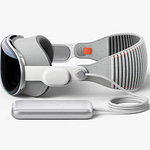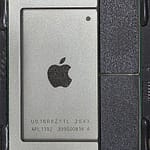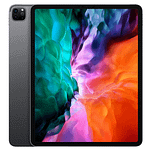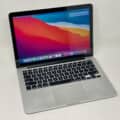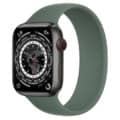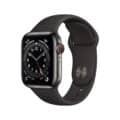- All Apple Devices
- iPad
- Apple iPad Pro 12.9-inch 3rd Gen 2018
Apple iPad Pro 12.9-inch 3rd Gen 2018
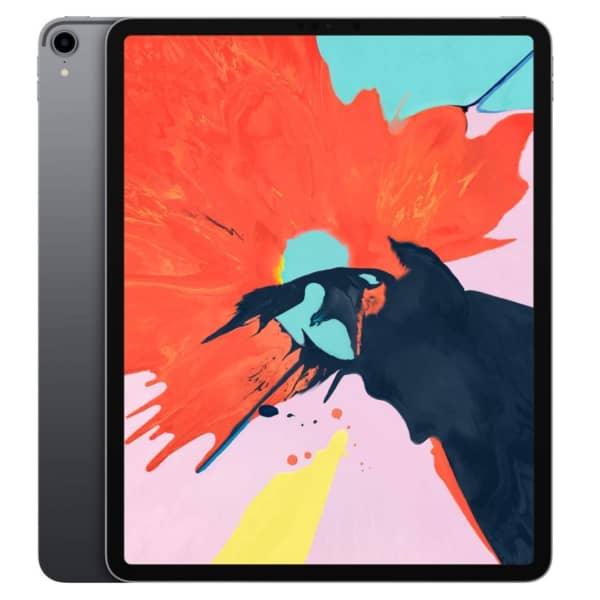

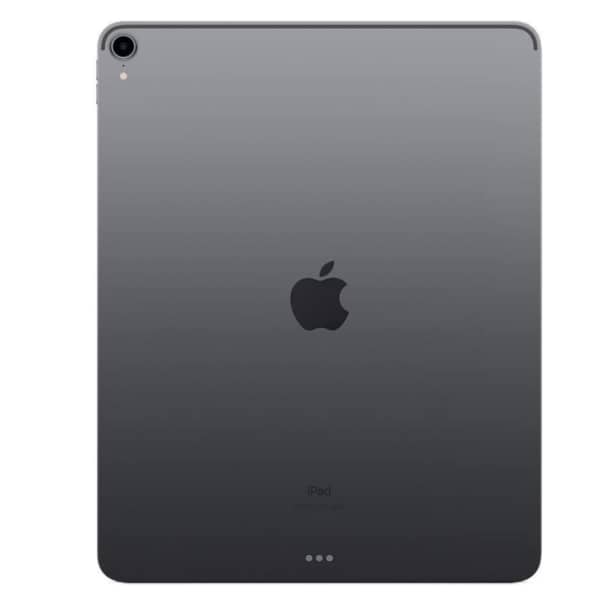
Apple iPad Pro 12.9-inch 3rd Generation
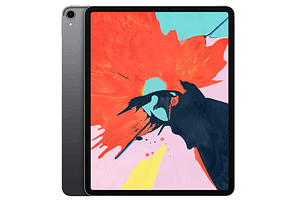
Product Brand: Apple
4.5
Pros
- Large, high-resolution display
- Powerful performance
- Face ID
- Apple Pencil support
- USB-C port
Cons
- No headphone jack
- No expandable storage
- Fragile
- Limited software
Apple iPad Pro 12.9-inch 3rd Generation Review and Features
The Apple iPad Pro 12.9-inch 3rd Gen was released in 2018 as a high-end tablet for professionals and power users. It features an immersive 12.9-inch Liquid Retina display, powerful A12X Bionic chip, and advanced Face ID technology for secure authentication.
Specifications
Here are some of the key specifications of the Apple iPad Pro 12.9-inch 3rd Gen:
- Display: 12.9-inch Liquid Retina display with ProMotion technology (2732×2048 resolution)
- Processor: A12X Bionic chip with 64-bit architecture and Neural Engine
- Storage: 64GB, 256GB, 512GB, or 1TB storage options
- Rear Camera: 12MP wide camera with f/1.8 aperture
- Front Camera: 7MP TrueDepth camera with f/2.2 aperture
- Face ID: Enabled through the TrueDepth camera system
- Battery Life: Up to 10 hours of web browsing, video watching, or music playback on a single charge
- Operating System: iOS 12, upgradable to iPadOS 14.4
- Connectivity: Wi-Fi and Bluetooth 5.0, with optional cellular connectivity
- Other Features: Four-speaker audio system, USB-C connector, and support for the second-generation Apple Pencil and Smart Keyboard Folio
Features
The Apple iPad Pro 12.9-inch 3rd Gen comes with several features that make it a top-of-the-line tablet for power users:
Immersive Display: The large 12.9-inch Liquid Retina display with ProMotion technology delivers stunning visuals with smooth motion and a wide color gamut.
Powerful Performance: The A12X Bionic chip with Neural Engine delivers fast and responsive performance for demanding tasks like photo and video editing, gaming, and multitasking.
Advanced Face ID: The TrueDepth camera system enables secure authentication through Face ID, which uses facial recognition technology to unlock the device and authenticate purchases and logins.
High-Quality Cameras: The 12MP wide camera and 7MP TrueDepth camera capture high-quality photos and videos, with features like Smart HDR, portrait mode, and 4K video recording.
Long Battery Life: The iPad Pro 12.9-inch 3rd Gen offers up to 10 hours of battery life on a single charge, so you can use it all day without worrying about running out of power.
Versatile Connectivity: With Wi-Fi and Bluetooth 5.0, as well as optional cellular connectivity, you can stay connected wherever you go. The USB-C connector supports fast charging and allows you to connect to a variety of accessories and peripherals.
Support for Accessories: The iPad Pro 12.9-inch 3rd Gen is compatible with the second-generation Apple Pencil and Smart Keyboard Folio, making it a versatile and powerful tool for artists, writers, and professionals.
Overall, the Apple iPad Pro 12.9-inch 3rd Gen is a high-performance tablet that offers a stunning display, powerful performance, and advanced features for professionals and power users.
Unlike iPhone models featuring Face ID until iOS 16, the third-generation iPad Pro can unlock in any orientation. The tablets were released on November 7, 2018, only available in Silver and Space Gray as the Gold and Rose Gold finishes from the previous generation have been removed. The 3rd-generation iPad Pro was notably the thinnest iPad yet at 5.9 mm thick.
Here’s a summary of the technical specifications for the Apple iPad Pro 12.9-inch 3rd Generation tablet:
- Processor/CPU: Octa-core (4×2.5 GHz Vortex + 4×1.6 GHz Tempest) Apple A12X Bionic
- RAM: 4 GB
- Internal Storage: 64 GB, 256 GB, 512 GB, 1 TB
- Display/Resolution: 12.9″ 2048×2732 pixels
- GPU/Graphics: Apple GPU
- Camera: 12MP 2160p
- Battery: 9720mAh Li-Po
- Colours: Silver, Space Gray
Full Technical Specifications
General
| Device Type | Tablet Computer |
| Models |
A2014, A1895, A1876, A1983, iPad8,5, iPad8,6, iPad8,7, iPad8,8 Also known as Apple iPad Pro (12.9-inch, 3rd generation) Wi-Fi + Cellular + GPS: A2014, A1895 (Global); A1983 (China) Wi-Fi only, w/o GPS: A1876 (Global) |
| Announced | 30 October, 2018 |
| Released | 07 November, 2018 |
| Status | Available |
| Predecessor | iPad Pro (2nd generation) |
| Successor | iPad Pro (4th generation) |
| Generation | 3rd |
Design
| Type Design Type called form factor refers to a mobile phone's size, shape, and style as well as the layout and position of major components of phone. There are three major form factors seen in mobile phones => bar phones, folding phones and sliding phones. | Bar |
| Weight | 631 g (Wi-Fi), 633 g (LTE) (1.39 lb) |
| Protection | Glass front, aluminum back, aluminum frame |
| Colors | Silver, Space Gray |
Network
| SIM SIM (Subscriber Identity Module) is a small card that contains mobile network subscriber's account information. This allows the phone using the card to attach to a mobile network. The SIM card is most commonly associated with GSM and UMTS mobile networks. Moving a SIM card from one phone to another allows a subscriber to switch mobile phones without having to contact their mobile network carrier. SIM cards can also be used by a phone to store limited amounts of data, such as phone numbers and text messages. | Nano SIM |
Display
| Display Type Display Technology => A number of display technologies and types used in mobile phones => TFT (Thin Film Transistor), IPS (In-Place Switching), OLED (Organic Light Emitting Diode), AMOLED (Active-Matrix Organic Light-Emitting Diode), Super AMOLED (an even advanced version of AMOLED), Resistive Touchscreen (Resistive touchscreens contain two layer of conductive material with a very small gap between them which acts as a resistance), Capacitive Touchsceen (Capacitive touchscreen technology consists of a layer of glass coated with a transparent conductor) | Liquid Retina display IPS LCD, 120Hz |
| Size | 12.9 inch, 515.3 cm2 (~85.4% screen-to-body ratio) |
| Resolution | 2048 x 2732 pixels, 4:3 ratio |
| Pixel Density Pixel Density (PPI) is refers to the concentration of pixels on a particular display, measured in pixels per inch (ppi). Pixel density is calculated by dividing the diagonal pixel resolution of a display by its diagonal size, higher pixel density better display quality. | 264 PPI density |
| Display Protection Display Protection => Gorilla Glass is a special alkali-aluminosilicate glass shield with exceptional damage resistance that helps protect mobile displays from scratches, drops, and bumps of everyday use, It is always better to go for a smartphone with Gorilla Glass for that added protection and peace of mind. | Scratch-resistant glass, oleophobic coating |
| Features |
12.9-inch (diagonal) LED-backlit Multi‑Touch display with IPS technology 2732-by-2048-pixel resolution at 264 pixels per inch (ppi) ProMotion technology Wide color display (P3) True Tone display Fingerprint-resistant oleophobic coating Fully laminated display Antireflective coating 1.8% reflectivity 600 nits brightness |
Media
| FM Radio | No |
| Loudspeaker | Yes, with stereo speakers |
| 3.5mm Audio jack | No |
Rear/Main Camera
Front/Selfie Camera
Software
| Operating System OS => Every computer system run on a base software called Operating System (OS). Operating System controls all basic operations of the computer (such as smartphone, PDAs, tablet computers and other handheld devices). The Operating System allows the user to install and run third party applications (apps), apps are used to add new functionality to the device. | iOS 12, up to iPadOS 15.6, planned upgrade to iPadOS 16 |
| User Interface UI or user interface of a device is the look and feel of the on-screen menu system. How it works, its color scheme, how it responds to button presses, all of these things are part of the user interface. | Apple iPad OS |
Hardware
| Chipset Chipset is a group of integrated circuits designed to perform one or a more dedicated functions, often with real time computing constraints, Popular smartphones are equipped with more advanced embedded chipsets that can do many different tasks depending on their programming. | Apple A12X Bionic (7 nm) |
| CPU CPU (Central Processing Unit) mostly known as processors, CPU processes instructions in order to carry out certain functions that make your device operate properly. Processors are often described as the brain of computers, smartphones and tablets, Smartphones and tablets rely on processors to carry out their every task, Processors are an incredibly important factor in selecting any type of computing device, including your smartphone. | Octa-core (4x2.5 GHz Vortex + 4x1.6 GHz Tempest) |
| GPU GPU (Graphics Processing Unit) is a single-chip processor designed to rapidly manipulate and alter memory to accelerate the creation of images in a frame buffer intended for output to a display, This includes things such as lighting effects, object transformations, and 3D motion. | Apple GPU (7-core graphics) |
| RAM (Memory) RAM (Random Access Memory) is a type of computer memory that can be accessed randomly, any byte of memory can be accessed without touching the preceding bytes that allows information to be stored and accessed quickly from random locations. RAM is the most common type of memory found in computer systems, smartphones, tablets and other electronic devices. | 4 GB |
| Internal Storage Internal Storage is a data storage space (flash memory) mostly used in smartphones, tablets and other electronic devices where operating system, apps, music, photos, videos, files and other user data Is stored. | 64/256/512/1TB |
| Card Slot Memory Card Slot is a special slot for inserting a memory card. Memory cards allow you to expand the phone's built-in memory, A memory card (sometimes called a flash memory card or a storage card) is a small storage medium used to store data such as text, pictures, audio, and video, for use on small, portable or remote computing devices such as mobile phones, mp3 players, digital cameras. | No |
| Sensors Sensors are electronic components that detects and responds to some type of input from the physical environment. The specific input could be light, heat, motion, moisture, pressure and location, The output is generally a signal that is converted to use in computing systems, a location sensor, such as a GPS receiver is able to detect current location of your electronic device. |
Face ID Three-axis gyro Accelerometer Barometer Ambient light sensor |
Connectivity
| Bluetooth Features Bluetooth is a wireless communications technology for exchanging data between mobile phones, headsets, computers and other network devices over short distances without wires, Bluetooth technology was primarily designed to support simple wireless networking of personal consumer devices. | 5.0, A2DP, LE, EDR |
| Infrared Infrared connectivity is an old wireless technology used to connect two electronic devices. It uses a beam of infrared light to transmit information and so requires direct line of sight and operates only at close range. | No |
| Wi-Fi Wi-Fi is a popular wireless networking technology using radio waves to provide high-speed network connections that allows devices to communicate without cords or cables, Wi-Fi is increasingly becoming the preferred mode of internet connectivity all over the world. | Wi-Fi 802.11 a/b/g/n/ac, dual-band, hotspot |
| USB | USB Type-C 3.1, magnetic connector |
| NFC NFC (Near field communication) is a set of standards for smartphones and similar devices to establish peer-to-peer radio communications with each other by touching them together or bringing them into proximity, usually no more than a few inch. | |
| HDMI HDMI (High-Definition Multimedia Interface) is a compact audio/video interface for transferring uncompressed video data and compressed or uncompressed digital audio data from a HDMI-compliant source device to a compatible computer monitor, video projector, digital television, or digital audio device. | No |
Battery or Power
| Battery Type Battery Type => Cell phones run on various kinds of batteries depending on the manufacturer, phone size or shape and features. There are basically four types of cell phone batteries => Lithium Polymer, Lithium Ion, Nickel Metal Hydride and Nickel Cadmium. | Li-Poly (Lithium Polymer) |
| Capacity Battery Capacity is a measure (typically in Amp-hr) of the charge stored by the battery, and is determined by the mass of active material contained in the battery. The battery capacity represents the maximum amount of energy that can be extracted from the battery under certain conditions. | 9720 mAh, (36.71 Wh) |
| Placement | Non-removable |
Disclaimer Note
We can not guarantee that the information on this page is 101% correct.

